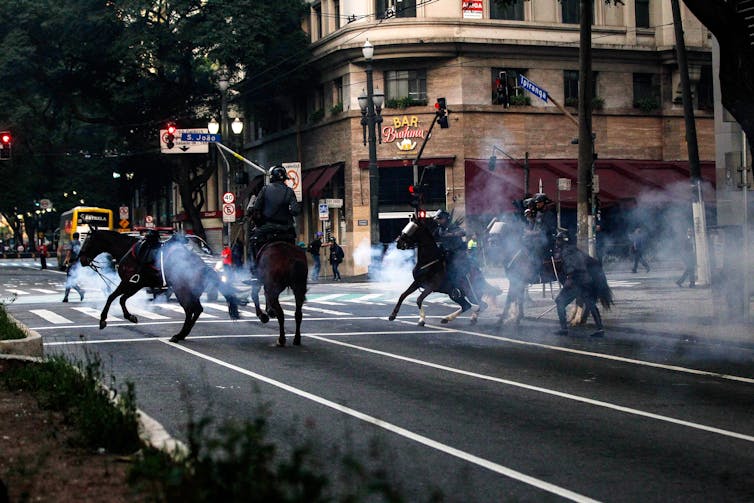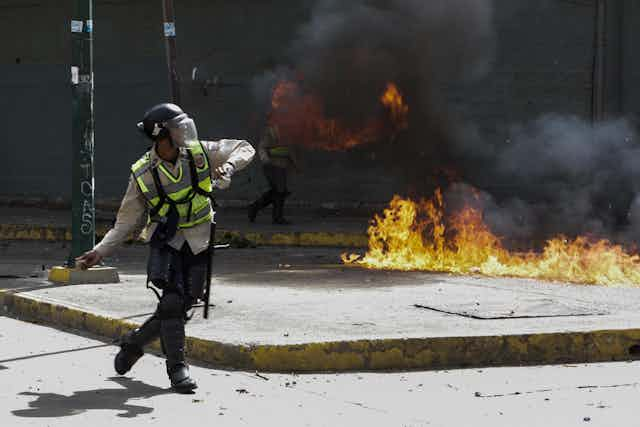Only a few years ago, both Venezuela and Brazil were racing towards heavyweight status in Latin America and beyond. Each of them was the force behind the creation of a major regional group – and both forged important alliances within and beyond the Americas. But today, both countries’ governments are struggling to hold on to power at home.
While almost every senior politician in Brazil is investigated for corruption (and in some cases even convicted), Venezuela’s government faces public uproar at corrupt misrule and economic collapse. Massive protests have become routine in both countries– and the usual business of government is suffering badly.
As different as these two monumental crises might look, they actually have a lot in common, and the similarities tell us a thing or two about the state of democracy and politics in Latin America at large. More than 30 years since the fall of South America’s various dictatorships, the region is still struggling to consolidate its democratic institutions. That two of its heavyweights are in such deep trouble shows just how badly things are going.
Brazil and Venezuela are dealing with the fallout of massive political corruption and, with it, democracy’s undelivered promises. They both suffer from not just corrupt individual officials, or even corrupt governments, but structural corruption permeating their political systems from top to bottom.
In Brazil, multi-million-dollar bribes were paid to politicians of all political colours. For instance, 318 out of the congress’s 594 members are under investigation for corruption as part of the massive “Operation Car Wash” probe. Lately, the investigations have reached the president, Michel Temer, and his immediate circle. Only a year after Temer supported the impeachment of his predecessor, Dilma Rousseff, he himself faces the possibility of being ousted by congress and tried in court.
But if Temer were to be tried and convicted for corruption, it is unclear who congress could appoint as his successor, since virtually none of the country’s better-known politicians is not under some sort of investigation.
Venezuela too has a long, sordid history of vast structural corruption. In 2008, a former Venezuelan representative to Transparency International, Gustavo Coronel, wrote a short commentary in which he vividly illustrated just how entrenched corruption had become in the years leading up to 2007. Ten years on, there’s little sign of improvement – but the opposition has yet to articulate a clear and constructive alternative.
The situation on the ground, meanwhile, is dramatically worse than in Brazil. Food shortages, scarcity and inflation have created a humanitarian crisis that is already spilling over the country’s borders, causing tension in Brazilian and Colombian border towns. The army has been put in charge of managing food imports and rationing, even to the point of stewarding long supermarket queues. This may seem like an undignified task for well-trained soldiers, but it has its perks – some estimates value food-related government theft at hundreds of millions of dollars. As retired General Cliver Alcala said: “Lately, food is a better business than drugs.”
Bad neighbours
Corruption is a major problem in the wider Latin American sphere – in Mexico, it’s widely recognised as the number one national problem. But the fallout from the corruption and bribery scandal around the massive Brazilian conglomerate Odebrecht is spilling over its borders, and politicians across the region are looking worried as Argentine, Colombian, Ecuadorian and Peruvian prosecutors see an opportunity to finally put somebody behind bars.
Like the funds generously spread around by Odebrecht, Venezuelan oil money has financed electoral campaigns throughout Latin America, ensuring its neighbours would prefer not to interfere in Venezuela’s domestic problems.

Meanwhile, recent protests in both countries have also been violently repressed. While Venezuela’s situation is again much more extreme than Brazil’s, the two governments have both employed the military to try to maintain order – with varying degrees of success (or rather, failure). Again, this has ramifications well beyond the two countries’ borders, setting a dangerous example for a region not long ago plagued by armed forces’ human rights abuses.
While in Brazil constitutional procedures are still being observed, the Venezuelan government has long crossed the boundaries of what is legal and within the rule of law. The constitution that the Bolivarian government seeks to change was approved in 1999 and amended in 2009, both times under the rule of Hugo Chávez. But Venezuela’s schedule for regional elections has been long ignored, and the government is now calling for a constitutional assembly, which would allow it to amend the constitution yet again, without going through the required legal steps.
Eyes open
But despite all this, the era of impunity may be coming to an end. Both the Brazilian and Venezuelan judiciaries are taking critical steps to rein in at least some of their governments’ excesses.
Operation Car Wash started with investigations led by a federal judge, Sergio Moro and are now being conducted by the Public Ministry (the body of independent public prosecutors) and the attorney general’s office. President Nicolás Maduro, meanwhile, has lost an ally in the chief prosecutor, Luisa Ortega Diaz, who has criticised the government-aligned Supreme Court for deciding to take over from the National Assembly – what she called a “rupture” of the constitutional order.
In an open letter, she also criticised the president’s call for a constitutional assembly: “A state transformation that can potentially lead to a new constitution is neither necessary nor relevant in the search of a solution to the indisputable and unprecedented crisis the country is going through.”
Taken together, these two cases show that democracy in Latin America as a whole is still unsteady on its feet, with many presidents so powerful as to effectively override any limits on the executive. But just as some judiciaries are asserting themselves again, some states in the region are finding it increasingly difficult to turn a blind eye to their neighbours’ behaviour.
When Venezuela closed its elected (and opposition-dominated) National Assembly, Colombia, Chile and Peru withdrew their ambassadors. Meanwhile, the regional bloc Mercosur and the hemispheric Organisation of American States called for emergency meetings, and the Union of South American Nations stepped up its efforts to engage the country’s factions in proper dialogue.
Venezuela has not responded well, even going so far as to announce its withdrawal from the OAS altogether. But that it was even under pressure in the first place proves that Latin America’s institutions aren’t completely toothless.

